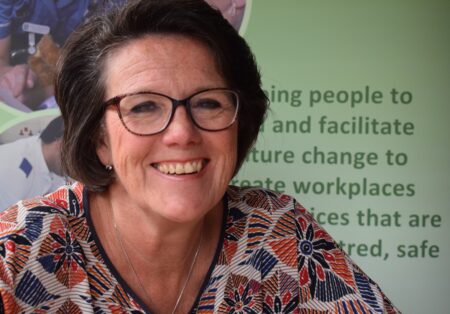Home News & Views Putting practice development principles into action
Putting practice development principles into action
Jo Odell, Practice Development Facilitator

For almost two decades, the International Practice Development Collaborative (IPDC) has worked to develop the theoretical underpinnings of practice development as a methodology for transforming practice and workplace cultures. This involved the identification of a number of principles. The principles were first published in Practice Development in Nursing: International Perspectives (Manley et al., 2008) and also included in Practice Development in Nursing and Healthcare (McCormack et al., 2013, Second edition). In the autumn of 2019, members of the IPDC came together again to continue to develop the body of knowledge around practice development, resulting in the publication of a new book in May 2021: International Practice Development in Health and Social Care (2021) 2nd Edition (Eds. Kim Manley, Valerie Wilson and Christine Øye).
I was delighted to be one of a number of international collaborators who connected and worked together using Zoom. Using a collaborative, inclusive and participatory approach, we all engaged with our local stakeholders to hear how people understood the practice development principles and were using them to inform their practice. Undertaking a critical review process involving practitioners enabled the authors to co- create a revision of the principles. Consequently, a stepped approach to engaging with the practice development principles has been created: a global manifesto which we hope is both engaging and memorable. The authors found a new way of organising the principles from a PD foundation level, through to introducing the PD processes, towards the achievement of PD outcomes and sustainable transformation.
Practice Development ‘is fundamentally about person centred practice that promotes safe and effective workplace cultures where all can flourish’ and ‘uses collaborative, inclusive and participatory (CIP) approaches’ (Hardy et al., 2021, p 110). I’d like to give some practical examples of how the FoNS Inspire Improvement Fellows have put CIP approaches into practice as part of their journey towards person-centred practice. These examples come from their published blogs.
Using collaborative, inclusive and participatory approaches with staff
Joanne Mohammed, Blackburn Hospital, Lancashire
‘These discussions and the hitting of rock bottom as a team allowed us then to forge a way upwards. We had an away day which set us on the path to success. We learnt to talk to each other, to listen; to allow each one of us to have a voice and opportunity and encouragement to contribute to shared action plans. Our team motto, which we co-produced, became ‘Working Together, Caring Together, Learning Together’ and one morning I came into work to find it beautifully displayed on the ward wall. It had been created visually by the night team whilst I slept, like a Banksy mural it appeared unexpectedly out of nowhere. It is there as a constant reminder throughout our working days and nights of our shared values and aspiration as a team.’
Read full blog here.
Charlotte Keates, Royal Wolverhampton NHS Trust
‘I knew that the day needed to focus on them coming together as a team so I wanted them to have an appreciation of what other members may be feeling at that time. We then participated in a number of exercises aimed at helping them to come together as a wider team and develop an action plan for the future. At the end of the day everyone’s perceptions had changed. Back at work after the workshop I heard people talking about the day with their teams and asking what they could do differently in their areas. This was great as I could start to see people changing their mindset after only spending a day together using creativity and new approaches to participation and collaboration.’
Read full blog here.
Using collaborative, inclusive and participatory approaches with patients and carers
Ryan Rukas , Midlands Partnership NHS Trust
‘I then decided to use the cards when undertaking a young person and family review. These reviews are usually a pretty standard affair where I ask the child and family how things are with the team and more often than not I get the same answers from them as I did six months before. Not this time. I had pre-warned the family that this review was going to be different and they were intrigued to know what it was that would be happening … I have never had a review like this before. An emotional rollercoaster is the best way I can think of describing the hour or so I was there. This was a great experience for me and the family and shows how being creative can really bring out a person’s emotions and true feelings in a completely open and honest way.’
Read the full blog here.
Collaboration, Inclusion and participation in developing new ways of working
Helena Brown, Midlands Partnership Trust
‘With the wisdom of hindsight gained from the Inspire Improvement workshop days, I have become aware that it’s all too easy to think that our own way is the correct way, especially because we think that we are doing things to help staff or patients. However now what I realise is that everyone has different ways of thinking, learning and doing. Therefore, using other’s strengths and working together in order develop and implement change is better than me dictating what we are doing, even though I felt that the dictation was what was required at first.’
Read the full blog here.
I hope these small examples of how collaborative, inclusive and participatory approaches can really contribute to the start of your journey to creating safe, effective and person-centred cultures of care where all can flourish.
References:
A global manifesto for Practice Development: Revisiting Core Principles by Sally Hardy, Simone Clarke, Irena Anna Frei, Claire Morley, Jo Odell, Chris White and Valerie Wilson. Chapter 8 in International Practice Development in Health and Social Care (2021) 2nd Edition (Eds Kim Manley, Valerie Wilson and Christine Øye) pp 99-117.
Comments are closed.

